2015初一上册英语want用法知识点总结
关于want的用法总结大全

关于want的用法总结大全(最新版)编制人:__________________审核人:__________________审批人:__________________编制学校:__________________编制时间:____年____月____日序言下载提示:英语语法是针对英语语言进行研究后,系统地总结归纳出来的一系列语言规则。
英语语法的精髓在于掌握语言的使用。
而且,英语语法是一套完整的语言知识体系。
如果你想英语能够更进一步,英语语法就是其中的主要一环。
Download tips: English grammar is a series of language rules that are systematically summarized after studying the English language. The essence of English grammar lies in mastering the use of language. Moreover, English grammar is a complete language knowledge system. If you want English to go further, English grammar is the main link.正文内容want的意思v. 想要,希望,打算,需要…在场n. 需要的东西,缺少,贫穷变形:过去式: wanted;现在分词:wanting;过去分词:wanted;want用法want可以用作动词want的基本意思是“想”“要”,指人希望、愿意或决心做某事或获得某物,是日常用语,强调主观愿望。
引申可表示“缺少”“缺乏”“不够”“差”“没有”“应该”等。
want既可用作及物动词,也可用作不及物动词。
用作及物动词时,可接名词、代词、动词不定式、动名词作宾语,也可接以形容词、现在分词、过去分词、动词不定式、介词短语、副词充当补足语的复合宾语。
want的九种用法及例句
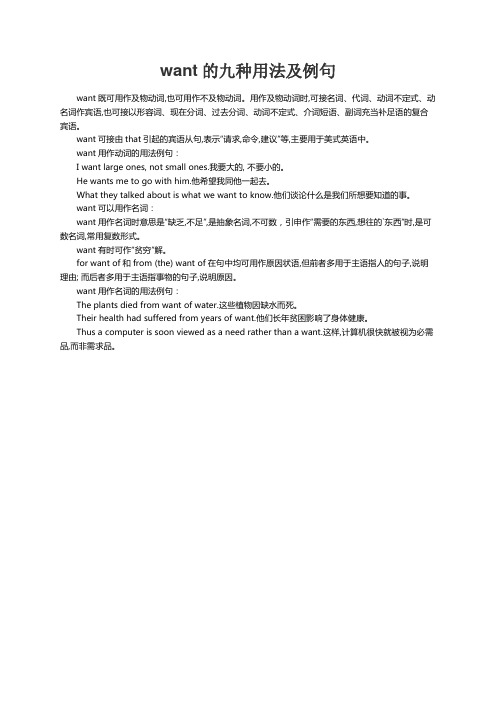
want的九种用法及例句
want既可用作及物动词,也可用作不及物动词。
用作及物动词时,可接名词、代词、动词不定式、动名词作宾语,也可接以形容词、现在分词、过去分词、动词不定式、介词短语、副词充当补足语的复合宾语。
want可接由that引起的宾语从句,表示“请求,命令,建议”等,主要用于美式英语中。
want用作动词的用法例句:
I want large ones, not small ones.我要大的, 不要小的。
He wants me to go with him.他希望我同他一起去。
What they talked about is what we want to know.他们谈论什么是我们所想要知道的事。
want可以用作名词:
want用作名词时意思是“缺乏,不足”,是抽象名词,不可数,引申作“需要的东西,想往的`东西”时,是可数名词,常用复数形式。
want有时可作“贫穷”解。
for want of和from (the) want of在句中均可用作原因状语,但前者多用于主语指人的句子,说明理由; 而后者多用于主语指事物的句子,说明原因。
want用作名词的用法例句:
The plants died from want of water.这些植物因缺水而死。
Their health had suffered from years of want.他们长年贫困影响了身体健康。
Thus a computer is soon viewed as a need rather than a want.这样,计算机很快就被视为必需品,而非需求品。
want的用法总结
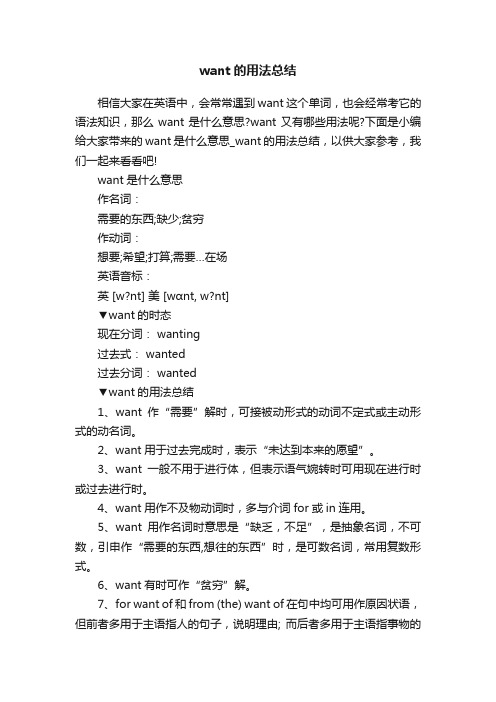
want的用法总结相信大家在英语中,会常常遇到want这个单词,也会经常考它的语法知识,那么want是什么意思?want又有哪些用法呢?下面是小编给大家带来的want是什么意思_want的用法总结,以供大家参考,我们一起来看看吧!want是什么意思作名词:需要的东西;缺少;贫穷作动词:想要;希望;打算;需要…在场英语音标:英 [w?nt] 美 [wɑnt, w?nt]▼want的时态现在分词: wanting过去式: wanted过去分词: wanted▼want的用法总结1、want作“需要”解时,可接被动形式的动词不定式或主动形式的动名词。
2、want用于过去完成时,表示“未达到本来的愿望”。
3、want一般不用于进行体,但表示语气婉转时可用现在进行时或过去进行时。
4、want用作不及物动词时,多与介词for或in连用。
5、want用作名词时意思是“缺乏,不足”,是抽象名词,不可数,引申作“需要的东西,想往的东西”时,是可数名词,常用复数形式。
6、want有时可作“贫穷”解。
7、for want of和from (the) want of在句中均可用作原因状语,但前者多用于主语指人的句子,说明理由; 而后者多用于主语指事物的句子,说明原因。
▼want的短语搭配want to do想要做for want of因为缺乏want ad分类广告;小广告not want to know不愿重视;不感兴趣want list所需货品清单want to bet?敢打赌吗want no truck with避免与…来往want one's bread buttered on both sides 抱有不切实际的希望;提出不合情理的要求will want none of something拒绝接受waste not, want not不浪费;不愁缺want to想;想要;希望I want我想要I want to我想want to be想成为;想要被;想要成为I want you我想要你;我希望你...;我要你们...want of想要want for想要;需要want someone需要人probably want可能想要in want of需要;想要;欲▼want的英语例句1. When life gets hard and you want to give up, remember that life is full of ups and downs, and without the downs, the ups would mean nothing.当生活很艰难,你想要放弃的时候,请记住,生活充满了起起落落,如果没有低谷,那站在高处也失去了意义。
总结一下want的用法和用法
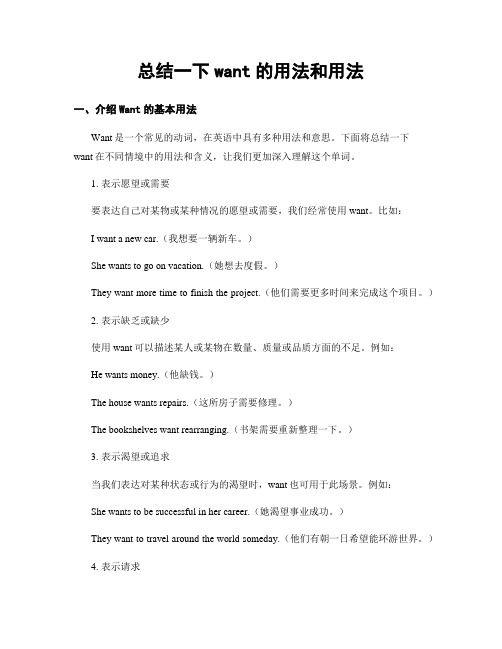
总结一下want的用法和用法一、介绍Want的基本用法Want是一个常见的动词,在英语中具有多种用法和意思。
下面将总结一下want在不同情境中的用法和含义,让我们更加深入理解这个单词。
1. 表示愿望或需要要表达自己对某物或某种情况的愿望或需要,我们经常使用want。
比如:I want a new car.(我想要一辆新车。
)She wants to go on vacation.(她想去度假。
)They want more time to finish the project.(他们需要更多时间来完成这个项目。
)2. 表示缺乏或缺少使用want可以描述某人或某物在数量、质量或品质方面的不足。
例如:He wants money.(他缺钱。
)The house wants repairs.(这所房子需要修理。
)The bookshelves want rearranging.(书架需要重新整理一下。
)3. 表示渴望或追求当我们表达对某种状态或行为的渴望时,want也可用于此场景。
例如:She wants to be successful in her career.(她渴望事业成功。
)They want to travel around the world someday.(他们有朝一日希望能环游世界。
)4. 表示请求Want还可以用于表达请求或询问对方的意愿。
例如:I want you to help me with this task.(我希望你能帮我完成这个任务。
)Do you want me to pick you up from the airport?(你需要我去机场接你吗?)二、Want短语的用法除了基本用法外,want还可以与其他词语结合使用,形成不同的短语表达方式。
下面是几个常见的want短语及其用法:1. Want for这个短语表示某人因缺乏某物而感到需要或想要。
例如:They are in want for food and shelter.(他们缺少食物和住所。
want和wants的用法
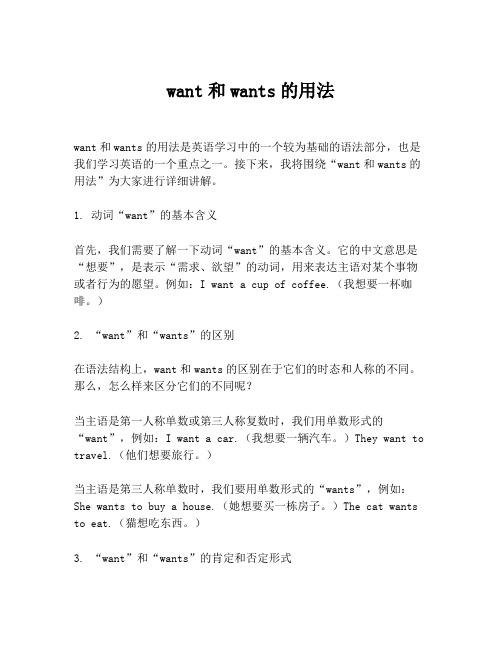
want和wants的用法want和wants的用法是英语学习中的一个较为基础的语法部分,也是我们学习英语的一个重点之一。
接下来,我将围绕“want和wants的用法”为大家进行详细讲解。
1. 动词“want”的基本含义首先,我们需要了解一下动词“want”的基本含义。
它的中文意思是“想要”,是表示“需求、欲望”的动词,用来表达主语对某个事物或者行为的愿望。
例如:I want a cup of coffee.(我想要一杯咖啡。
)2. “want”和“wants”的区别在语法结构上,want和wants的区别在于它们的时态和人称的不同。
那么,怎么样来区分它们的不同呢?当主语是第一人称单数或第三人称复数时,我们用单数形式的“want”,例如:I want a car.(我想要一辆汽车。
)They want to travel.(他们想要旅行。
)当主语是第三人称单数时,我们要用单数形式的“wants”,例如:She wants to buy a house.(她想要买一栋房子。
)The cat wants to eat.(猫想吃东西。
)3. “want”和“wants”的肯定和否定形式此外,我们还需要了解“want”和“wants”的肯定和否定形式。
肯定形式:I want a cup of tea.(我想要一杯茶。
)He wants to go to the cinema.(他想去电影院。
)否定形式:I don't want to go to work.(我不想去上班。
)She doesn't want to play basketball.(她不想打篮球。
)4. “want”和“wants”的疑问形式最后,我们也需要了解一下“want”和“wants”的疑问形式。
疑问形式:Do you want a drink?(你想要喝点什么吗?)Does he want to come with us?(他想要和我们一起来吗?)总之,“want”和“wants”是表示“想要”的动词,但是需要根据主语的不同来区分它们的时态和人称。
want的三个用法
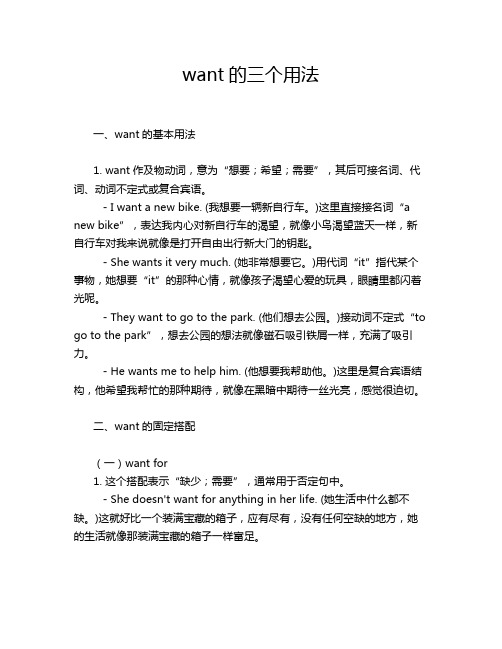
want的三个用法一、want的基本用法1. want作及物动词,意为“想要;希望;需要”,其后可接名词、代词、动词不定式或复合宾语。
- I want a new bike. (我想要一辆新自行车。
)这里直接接名词“a new bike”,表达我内心对新自行车的渴望,就像小鸟渴望蓝天一样,新自行车对我来说就像是打开自由出行新大门的钥匙。
- She wants it very much. (她非常想要它。
)用代词“it”指代某个事物,她想要“it”的那种心情,就像孩子渴望心爱的玩具,眼睛里都闪着光呢。
- They want to go to the park. (他们想去公园。
)接动词不定式“to go to the park”,想去公园的想法就像磁石吸引铁屑一样,充满了吸引力。
- He wants me to help him. (他想要我帮助他。
)这里是复合宾语结构,他希望我帮忙的那种期待,就像在黑暗中期待一丝光亮,感觉很迫切。
二、want的固定搭配(一)want for1. 这个搭配表示“缺少;需要”,通常用于否定句中。
- She doesn't want for anything in her life. (她生活中什么都不缺。
)这就好比一个装满宝藏的箱子,应有尽有,没有任何空缺的地方,她的生活就像那装满宝藏的箱子一样富足。
- We don't want for friends. (我们不缺朋友。
)朋友就像生活中的星星,照亮我们的道路,而我们的生活中已经布满了这样的星星,一点也不缺少。
2. (二)want in/ out- “want in”表示“想要进入;希望被接受”,“want out”表示“想要出去;想要摆脱”。
- The dog wants in. It's cold outside. (狗想要进来。
外面很冷呢。
)那只狗在门外可怜巴巴的样子,就像一个被拒之门外的小可怜,寒冷的天气让它特别渴望屋里的温暖。
want的三种句型例句-定义说明解析
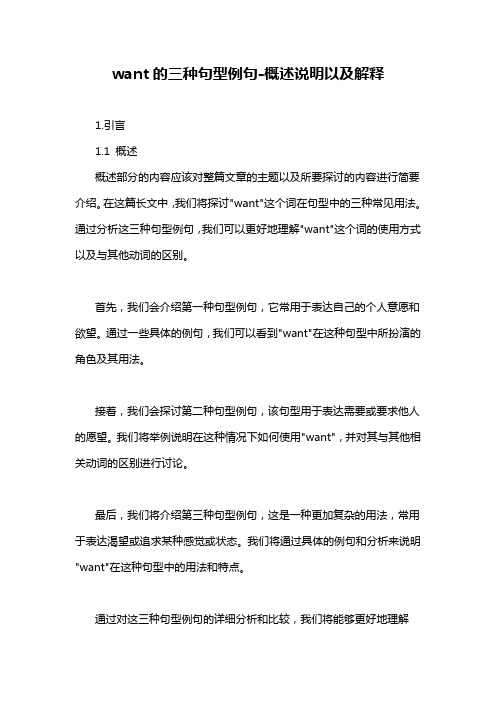
want的三种句型例句-概述说明以及解释1.引言1.1 概述概述部分的内容应该对整篇文章的主题以及所要探讨的内容进行简要介绍。
在这篇长文中,我们将探讨"want"这个词在句型中的三种常见用法。
通过分析这三种句型例句,我们可以更好地理解"want"这个词的使用方式以及与其他动词的区别。
首先,我们会介绍第一种句型例句,它常用于表达自己的个人意愿和欲望。
通过一些具体的例句,我们可以看到"want"在这种句型中所扮演的角色及其用法。
接着,我们会探讨第二种句型例句,该句型用于表达需要或要求他人的愿望。
我们将举例说明在这种情况下如何使用"want",并对其与其他相关动词的区别进行讨论。
最后,我们将介绍第三种句型例句,这是一种更加复杂的用法,常用于表达渴望或追求某种感觉或状态。
我们将通过具体的例句和分析来说明"want"在这种句型中的用法和特点。
通过对这三种句型例句的详细分析和比较,我们将能够更好地理解"want"的用法,并且能够在实际应用中更准确地运用这个词。
接下来,我们将逐一介绍这三种句型,并提供一些实用的例句和解释。
1.2 文章结构本文共分为三个部分:引言、正文和结论。
在引言部分,我们将对本文的主题进行概述,介绍want的三种句型例句的重要性和应用场景,并明确本文的目的和总结。
在正文部分,我们将详细介绍want的三种句型例句,包括第一种句型例句、第二种句型例句和第三种句型例句。
每种句型例句将分为三个小节,分别列举和解释该种句型的三个具体例句,以帮助读者更好地理解和运用这些例句。
在结论部分,我们将对每种句型例句进行总结,包括其特点、应用场景和使用注意事项,以帮助读者更好地掌握和运用这些句型例句。
通过以上文章结构的安排,我们将全面介绍和解释want的三种句型例句,帮助读者提高英语写作和口语表达的水平。
want和would的用法
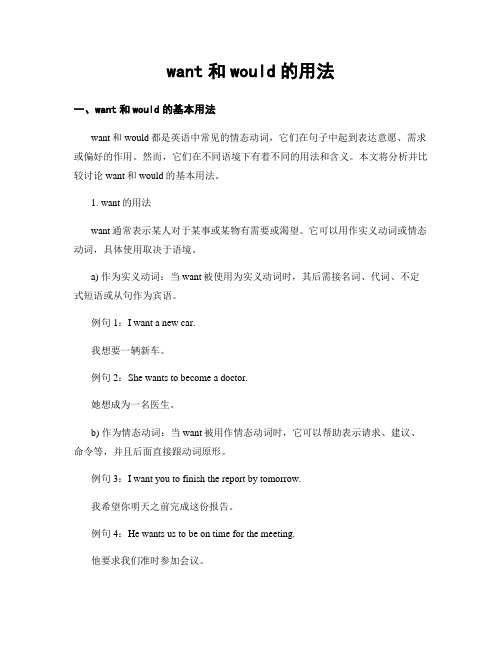
want和would的用法一、want和would的基本用法want和would都是英语中常见的情态动词,它们在句子中起到表达意愿、需求或偏好的作用。
然而,它们在不同语境下有着不同的用法和含义。
本文将分析并比较讨论want和would的基本用法。
1. want的用法want通常表示某人对于某事或某物有需要或渴望。
它可以用作实义动词或情态动词,具体使用取决于语境。
a) 作为实义动词:当want被使用为实义动词时,其后需接名词、代词、不定式短语或从句作为宾语。
例句1:I want a new car.我想要一辆新车。
例句2:She wants to become a doctor.她想成为一名医生。
b) 作为情态动词:当want被用作情态动词时,它可以帮助表示请求、建议、命令等,并且后面直接跟动词原形。
例句3:I want you to finish the report by tomorrow.我希望你明天之前完成这份报告。
例句4:He wants us to be on time for the meeting.他要求我们准时参加会议。
2. would的用法would是will 的过去式,用来表示过去的未来或虚拟语气。
它常用于表达礼貌、客气或非真实假设的情况。
a) 表达愿望:would可以用来表达一种希望或欲望,强调想要某事发生或实现。
例句5:I would like to visit Paris someday.我希望有一天能够去巴黎旅行。
b) 礼貌地提出请求:would可以表示礼貌地提出请求或询问某人是否愿意做某事。
例句6:Would you mind closing the window, please?请你关上窗户好吗?c) 虚拟语气条件句:would可以用在虚拟语气条件句中,表示对未来可能发生的假设或推测。
例句7:If I had more time, I would travel around the world.如果我有更多时间,我会环游世界。
want的用法总结

want的用法总结一、want作为动词1. want表示希望、需要或渴望某事物,常与宾语连用。
例如:- I want a new car.我想要一辆新车。
- She wants to be a doctor.她想成为医生。
- Do you want anything to eat?你想吃点什么吗?2. want还可表示缺少或需要某物,此时通常使用want for/of来表达。
例如:- The garden wants for water.花园需要浇水。
- We want of nothing here.我们在这里什么都不缺。
3. 在陈述句中,want可以表示疑问、怀疑或不相信,往往有否定的意味。
例如:- I don't want him to come with us.我不希望他和我们一起去。
- She didn't want me to know about the surprise party.她不希望我知道惊喜派对的事。
4. 另外,want还可以表示应该做某事(情态动词)。
例如:- You want to be careful when crossing the street.过马路时你应该小心。
二、want作为名词1. want作为名词,意味着需求、愿望或欲望。
例如:- His wants are simple—food, shelter, and companionship.他的需求很简单——食物、住所和陪伴。
2. in want是一个习语,意为贫困、缺乏。
例如:- Many people in the world are in want of basic necessities.世界上许多人缺乏基本生活必需品。
三、want的常见搭配1. want + 宾语 + 不定式:表示希望或渴望某人做某事。
例如:- I want you to clean your room before dinner.我希望你在晚餐前把你的房间打扫干净。
want的用法总结大全
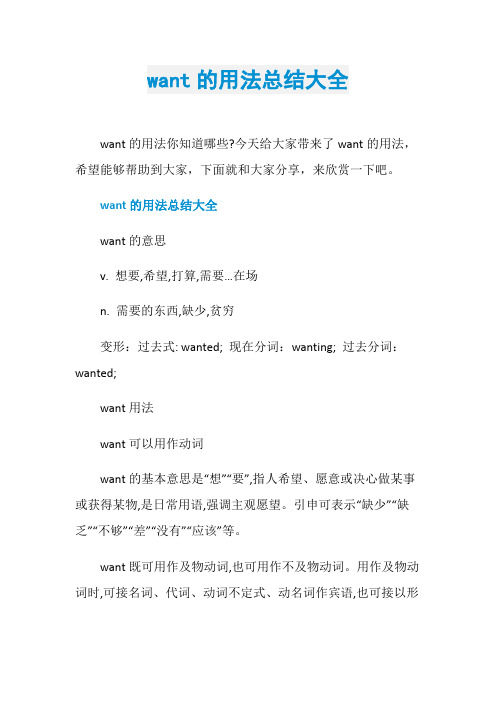
want的用法总结大全want的用法你知道哪些?今天给大家带来了want的用法,希望能够帮助到大家,下面就和大家分享,来欣赏一下吧。
want的用法总结大全want的意思v. 想要,希望,打算,需要…在场n. 需要的东西,缺少,贫穷变形:过去式: wanted; 现在分词:wanting; 过去分词:wanted;want用法want可以用作动词want的基本意思是“想”“要”,指人希望、愿意或决心做某事或获得某物,是日常用语,强调主观愿望。
引申可表示“缺少”“缺乏”“不够”“差”“没有”“应该”等。
want既可用作及物动词,也可用作不及物动词。
用作及物动词时,可接名词、代词、动词不定式、动名词作宾语,也可接以形容词、现在分词、过去分词、动词不定式、介词短语、副词充当补足语的复合宾语。
want可接由that引起的宾语从句,表示“请求,命令,建议”等,主要用于美式英语中。
want用作动词的用法例句I want large ones, not small ones.我要大的, 不要小的。
He wants me to go with him.他希望我同他一起去。
What they talked about is what we want to know.他们谈论什么是我们所想要知道的事。
want可以用作名词want用作名词时意思是“缺乏,不足”,是抽象名词,不可数,引申作“需要的东西,想往的东西”时,是可数名词,常用复数形式。
want有时可作“贫穷”解。
for want of和from (the) want of在句中均可用作原因状语,但前者多用于主语指人的句子,说明理由; 而后者多用于主语指事物的句子,说明原因。
want用作名词的用法例句The plants died from want of water.这些植物因缺水而死。
Their health had suffered from years of want.他们长年贫困影响了身体健康。
want和wants的用法
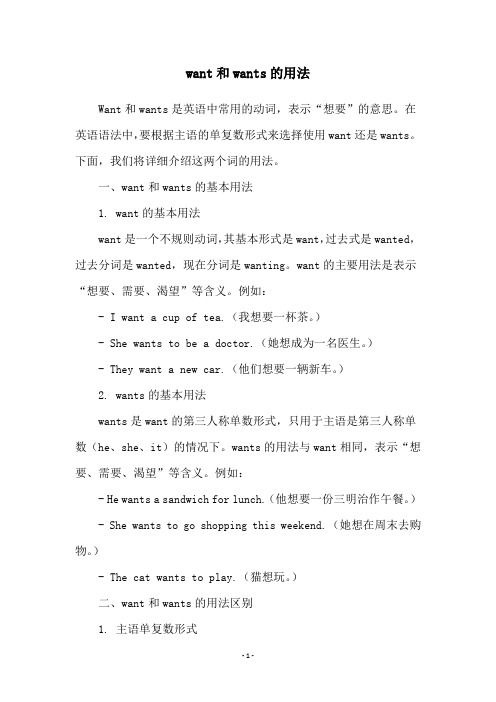
want和wants的用法Want和wants是英语中常用的动词,表示“想要”的意思。
在英语语法中,要根据主语的单复数形式来选择使用want还是wants。
下面,我们将详细介绍这两个词的用法。
一、want和wants的基本用法1. want的基本用法want是一个不规则动词,其基本形式是want,过去式是wanted,过去分词是wanted,现在分词是wanting。
want的主要用法是表示“想要、需要、渴望”等含义。
例如:- I want a cup of tea.(我想要一杯茶。
)- She wants to be a doctor.(她想成为一名医生。
)- They want a new car.(他们想要一辆新车。
)2. wants的基本用法wants是want的第三人称单数形式,只用于主语是第三人称单数(he、she、it)的情况下。
wants的用法与want相同,表示“想要、需要、渴望”等含义。
例如:- He wants a sandwich for lunch.(他想要一份三明治作午餐。
) - She wants to go shopping this weekend.(她想在周末去购物。
)- The cat wants to play.(猫想玩。
)二、want和wants的用法区别1. 主语单复数形式want用于主语是第一人称单数(I)、第二人称单数(you)和第一、二、三人称复数(we、you、they)的情况下。
例如:- I want to go to the cinema.(我想去看电影。
)- You want to buy a new phone.(你想买一部新手机。
)- We want to travel to Europe.(我们想去欧洲旅行。
)- They want to learn Chinese.(他们想学中文。
)wants只用于主语是第三人称单数(he、she、it)的情况下。
want用作及物动词
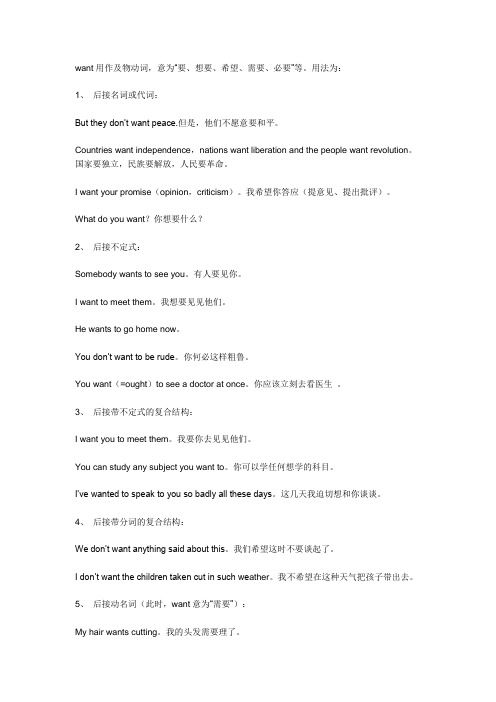
want用作及物动词,意为“要、想要、希望、需要、必要”等。
用法为:1、后接名词或代词:But they don’t want peace.但是,他们不愿意要和平。
Countries want independence,nations want liberation and the people want revolution。
国家要独立,民族要解放,人民要革命。
I want your promise(opinion,criticism)。
我希望你答应(提意见、提出批评)。
What do you want?你想要什么?2、后接不定式:Somebody wants to see you。
有人要见你。
I want to meet them。
我想要见见他们。
He wants to go home now。
You don’t want to be rude。
你何必这样粗鲁。
You want(=ought)to see a doctor at once。
你应该立刻去看医生。
3、后接带不定式的复合结构:I want you to meet them。
我要你去见见他们。
You can study any subject you want to。
你可以学任何想学的科目。
I’ve wanted to speak to you so badly all these days。
这几天我迫切想和你谈谈。
4、后接带分词的复合结构:We don’t want anything said about this。
我们希望这时不要谈起了。
I don’t want the children taken cut in such we ather。
我不希望在这种天气把孩子带出去。
5、后接动名词(此时,want意为“需要”):My hair wants cutting。
我的头发需要理了。
This curtain wants washing。
want的用法总结
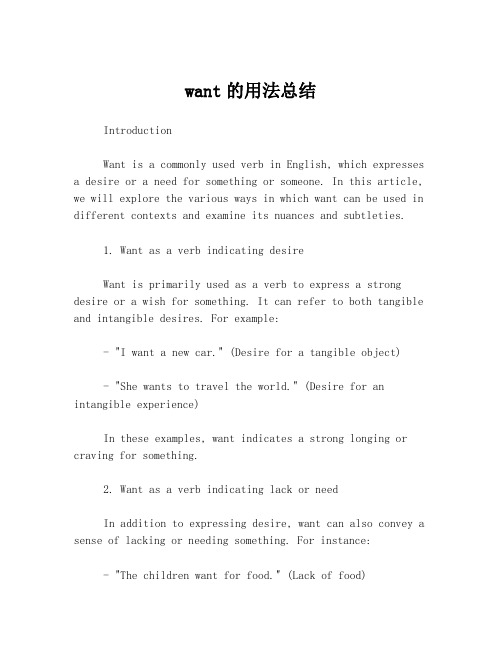
want的用法总结IntroductionWant is a commonly used verb in English, which expresses a desire or a need for something or someone. In this article, we will explore the various ways in which want can be used in different contexts and examine its nuances and subtleties.1. Want as a verb indicating desireWant is primarily used as a verb to express a strong desire or a wish for something. It can refer to both tangible and intangible desires. For example:- "I want a new car." (Desire for a tangible object)- "She wants to travel the world." (Desire for an intangible experience)In these examples, want indicates a strong longing or craving for something.2. Want as a verb indicating lack or needIn addition to expressing desire, want can also convey a sense of lacking or needing something. For instance:- "The children want for food." (Lack of food)- "I want for nothing in this luxurious mansion." (No need for anything)These examples emphasize a sense of deprivation or insufficiency.3. Want as a verb indicating requirement or necessityWant can also be used to express a requirement, necessity, or obligation. This usage is often found in formal or legal contexts. Consider the following examples:- "All students want to pass the final exam to graduate." (Requirement)- "The contract wants the signatures of both parties." (Necessity)- "The law wants every citizen to pay their taxes." (Obligation)Here, want indicates what is expected or demanded in a particular situation.4. Want as a verb expressing will or intentionWant can be used to convey will or intention, expressing a determination or purpose. This usage often occurs in the negative form "not want." Look at the following examples:- "He does not want to hurt anyone's feelings." (Intention)- "I do not want to go against my principles." (Will)In these instances, want reveals the person's determination or resolve.5. Want as a nounWant can also function as a noun, meaning a lack or shortage of something. This usage is most commonly seen in old English literature or formal writing. For example:- "The want of love left him feeling empty." (Lack of love)- "There was a want of basic amenities in the impoverished village." (Shortage of basic amenities)The noun form emphasizes deficiency or scarcity.ConclusionWant is a versatile verb that can be used in various contexts to express desire, lack, need, requirement, intention, and even serve as a noun indicating a shortage or deficiency. Understanding the different nuances and subtleties of want's usage can greatly enhance one's mastery of the English language.。
七年级上册重点词用法解析
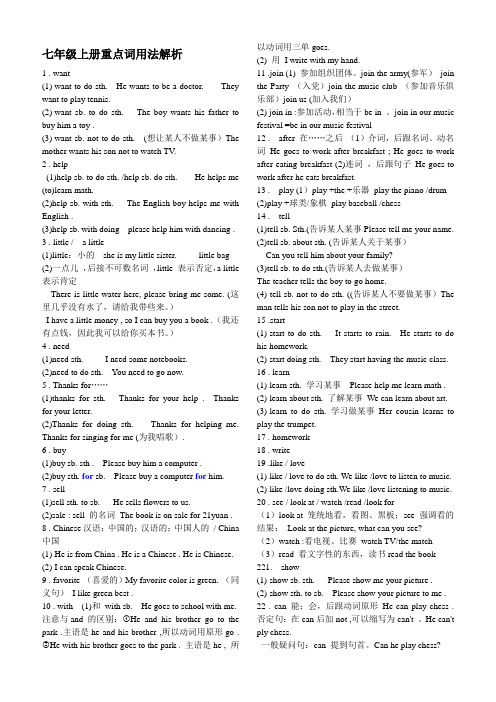
七年级上册重点词用法解析1 . want(1)want to do sth. He wants to be a doctor. They want to play tennis.(2)want sb. to do sth. The boy wants his father to buy him a toy .(3)want sb. not to do sth. (想让某人不做某事)The mother wants his son not to watch TV.2 . help(1)help sb. to do sth. /help sb. do sth. He helps me (to)learn math.(2)help sb. with sth. The English boy helps me with English .(3)help sb. with doing please help him with dancing .3 . little / a little(1)little:小的she is my little sister. little bag(2)一点儿,后接不可数名词,little 表示否定,a little 表示肯定There is little water here, please bring me some. (这里几乎没有水了,请给我带些来。
)I have a little money , so I can buy you a book .(我还有点钱,因此我可以给你买本书。
)4 . need(1)need sth. I need some notebooks.(2)need to do sth. You need to go now.5 . Thanks for……(1)thanks for sth. Thanks for your help . Thanks for your letter.(2)Thanks for doing sth. Thanks for helping me. Thanks for singing for me (为我唱歌).6 . buy(1)buy sb. sth . Please buy him a computer .(2)buy sth. for sb. Please buy a computer for him.7 . sell(1)sell sth. to sb. He sells flowers to us.(2)sale : sell 的名词The book is on sale for 21yuan .8 . Chinese汉语;中国的;汉语的;中国人的/ China 中国(1)He is from China . He is a Chinese . He is Chinese.(2)I can speak Chinese.9 . favorite (喜爱的)My favorite color is green. (同义句)I like green best .10 . with (1)和with sb. He goes to school with me. 注意与and 的区别:①He and his brother go to the park .主语是he and his brother ,所以动词用原形go .②He with his brother goes to the park . 主语是he , 所以动词用三单goes.(2) 用I write with my hand.11 .join (1) 参加组织团体。
want的用法和搭配

want的用法和搭配一级标题:Want的用法和搭配二级标题1:Want 的基本含义和用法"Want"是一个常见的动词,表示强烈地想要或需要某样东西或特定的行为。
它被广泛应用于日常交流、书面表达以及正式场合。
在英语中,"want"可以描述物质和非物质层面上的渴望或需求。
1. 表示物质层面上的渴望:当我们想要获得某个东西时,可以使用 "want to have" 或者 "want + 名词" 来表达这种渴望。
例如:- I want to have a new car.我想要买一辆新车。
- She wants a piece of cake.她想吃一块蛋糕。
2. 表示非物质层面上的渴望:在表达对于某种状态、经历或感受的渴望时,可以使用 "want to be" 或者 "want + 形容词"。
例如:- He wants to be successful.他希望成功。
- They want to be happy.他们希望快乐。
3. 表示需要或提出请求:当需要某人做某事或向某人提出请求时,也可以使用"want to do something” 或者 "want somebo dy to do something” 这种形式。
例如:- I want to go shopping with you.我想和你一起去购物。
- She wants me to help her with the project.她希望我帮她完成这个项目。
二级标题2:Want 的搭配用法1. Want something done:这种表达方式表示希望或要求某事被完成。
在 "want" 后面使用不定式的被动形式,即 "want something done"。
lesson 105词汇用法总结
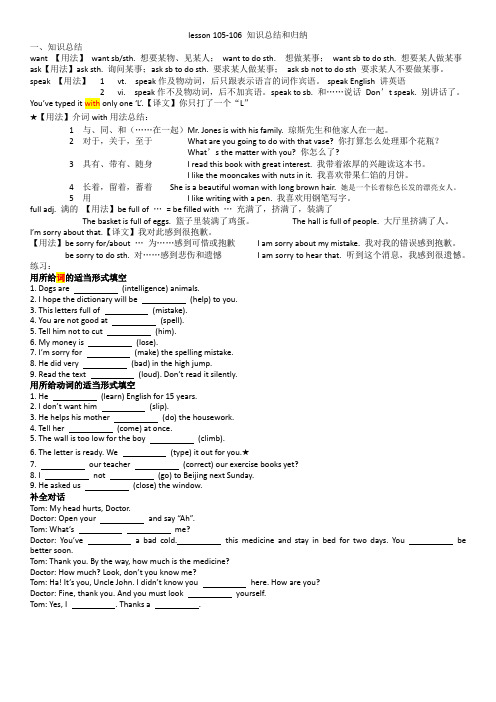
lesson 105-106 知识总结和归纳一、知识总结want 【用法】want sb/sth. 想要某物、见某人;want to do sth. 想做某事;want sb to do sth. 想要某人做某事ask【用法】ask sth. 询问某事;ask sb to do sth. 要求某人做某事;ask sb not to do sth 要求某人不要做某事。
speak 【用法】1vt. speak作及物动词,后只跟表示语言的词作宾语。
speak English 讲英语2vi. speak作不及物动词,后不加宾语。
speak to sb. 和……说话Don’t speak. 别讲话了。
You’ve typed it with only one ‘L’.【译文】你只打了一个“L”★【用法】介词with用法总结:1与、同、和(……在一起)Mr. Jones is with his family. 琼斯先生和他家人在一起。
2对于,关于,至于What are you going to do with that vase? 你打算怎么处理那个花瓶?What’s the matter with you? 你怎么了?3具有、带有、随身I read this book with great interest. 我带着浓厚的兴趣读这本书。
I like the mooncakes with nuts in it. 我喜欢带果仁馅的月饼。
4长着,留着,蓄着She is a beautiful woman with long brown hair. 她是一个长着棕色长发的漂亮女人。
5用I like writing with a pen. 我喜欢用钢笔写字。
full adj. 满的【用法】be full of …= be filled with …充满了,挤满了,装满了The basket is full of eggs. 篮子里装满了鸡蛋。
want的知识点总结
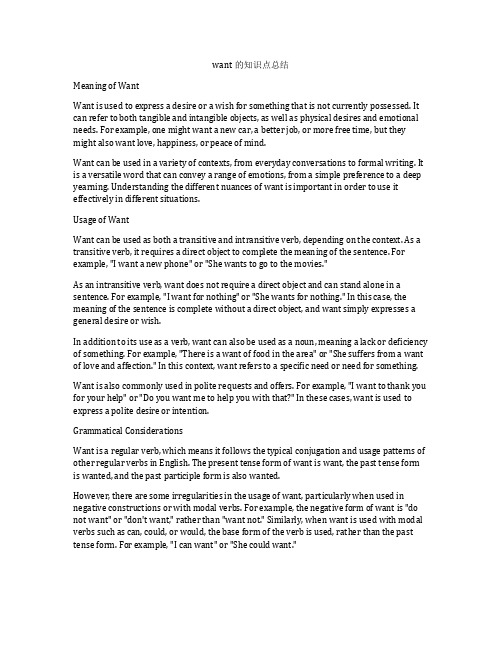
want的知识点总结Meaning of WantWant is used to express a desire or a wish for something that is not currently possessed. It can refer to both tangible and intangible objects, as well as physical desires and emotional needs. For example, one might want a new car, a better job, or more free time, but they might also want love, happiness, or peace of mind.Want can be used in a variety of contexts, from everyday conversations to formal writing. It is a versatile word that can convey a range of emotions, from a simple preference to a deep yearning. Understanding the different nuances of want is important in order to use it effectively in different situations.Usage of WantWant can be used as both a transitive and intransitive verb, depending on the context. As a transitive verb, it requires a direct object to complete the meaning of the sentence. For example, "I want a new phone" or "She wants to go to the movies."As an intransitive verb, want does not require a direct object and can stand alone in a sentence. For example, "I want for nothing" or "She wants for nothing." In this case, the meaning of the sentence is complete without a direct object, and want simply expresses a general desire or wish.In addition to its use as a verb, want can also be used as a noun, meaning a lack or deficiency of something. For example, "There is a want of food in the area" or "She suffers from a want of love and affection." In this context, want refers to a specific need or need for something.Want is also commonly used in polite requests and offers. For example, "I want to thank you for your help" or "Do you want me to help you with that?" In these cases, want is used to express a polite desire or intention.Grammatical ConsiderationsWant is a regular verb, which means it follows the typical conjugation and usage patterns of other regular verbs in English. The present tense form of want is want, the past tense form is wanted, and the past participle form is also wanted.However, there are some irregularities in the usage of want, particularly when used in negative constructions or with modal verbs. For example, the negative form of want is "do not want" or "don't want," rather than "want not." Similarly, when want is used with modal verbs such as can, could, or would, the base form of the verb is used, rather than the past tense form. For example, "I can want" or "She could want."In addition, want is often used in conjunction with other verbs to express specific meanings. For example, "I want to go" or "She wants to stay." In these cases, want is followed by an infinitive verb to express the desired action or state.Cultural and Social ContextThe concept of want is deeply ingrained in human nature and has been a topic of philosophical and psychological inquiry for centuries. Understanding and managing our wants and desires is a fundamental aspect of human behavior and plays a crucial role in shaping our actions and decisions.In Western societies, the pursuit of wants and desires is often seen as a fundamental aspect of personal freedom and self-expression. The ability to pursue and fulfill our wants is considered a basic human right and is often closely linked to the concept of happiness and fulfillment.In contrast, some Eastern philosophies and religions emphasize the importance of overcoming wants and desires as a means to achieve inner peace and spiritual enlightenment. The Buddhist concept of "desire is the root of all suffering" reflects this perspective and suggests that letting go of our wants and desires is the key to finding true happiness.The portrayal of wants and desires in popular culture and media also has a significant impact on our perceptions and behaviors. Advertising, marketing, and consumer culture often encourage us to want and consume more, feeding into a cycle of endless desire and discontent.Psychologically, wants and desires are often tied to our sense of identity and self-worth. The things we want and the goals we pursue can be deeply intertwined with our sense of who we are and what we value. Understanding the complex relationship between our wants and our sense of self can help us make more conscious and fulfilling choices.In conclusion, the concept of want is a fundamental aspect of human nature and plays a crucial role in shaping our thoughts, actions, and aspirations. Understanding the different meanings, uses, and cultural considerations of want can help us navigate the complex landscape of our desires and make more conscious and fulfilling choices.。
want和wants的用法
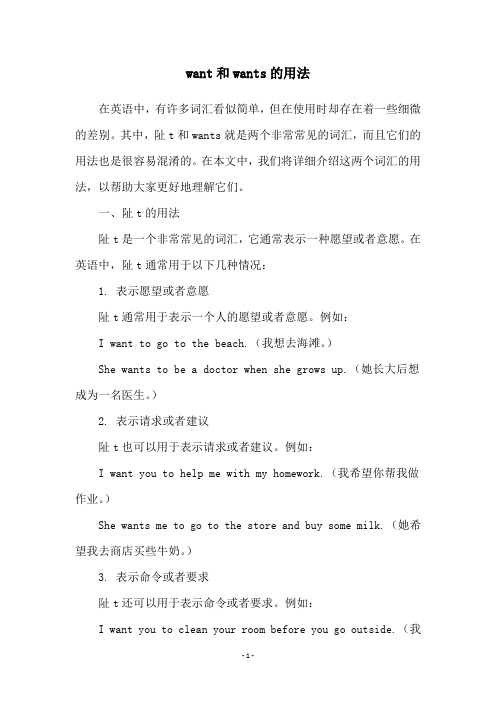
want和wants的用法在英语中,有许多词汇看似简单,但在使用时却存在着一些细微的差别。
其中,阯t和wants就是两个非常常见的词汇,而且它们的用法也是很容易混淆的。
在本文中,我们将详细介绍这两个词汇的用法,以帮助大家更好地理解它们。
一、阯t的用法阯t是一个非常常见的词汇,它通常表示一种愿望或者意愿。
在英语中,阯t通常用于以下几种情况:1. 表示愿望或者意愿阯t通常用于表示一个人的愿望或者意愿。
例如:I want to go to the beach.(我想去海滩。
)She wants to be a doctor when she grows up.(她长大后想成为一名医生。
)2. 表示请求或者建议阯t也可以用于表示请求或者建议。
例如:I want you to help me with my homework.(我希望你帮我做作业。
)She wants me to go to the store and buy some milk.(她希望我去商店买些牛奶。
)3. 表示命令或者要求阯t还可以用于表示命令或者要求。
例如:I want you to clean your room before you go outside.(我要求你在出门前清理你的房间。
)She wants me to finish my work before I go to bed.(她要求我在睡觉前完成我的工作。
)二、wants的用法与阯t不同,wants通常用于表示一个人的需求或者要求。
在英语中,wants通常用于以下几种情况:1. 表示需要或者要求wants通常用于表示一个人的需要或者要求。
例如:He wants to eat some pizza for dinner.(他想吃点比萨饼作为晚餐。
)She wants to go to the movies with her friends.(她想和朋友去看电影。
)2. 表示渴望或者期待wants还可以用于表示一个人的渴望或者期待。
want 用法

want 用法
"want" 还可以与其他词组合使用,形成一些常用的短语和习惯用法,如 "want for"(缺 乏)、"want in on"(想要参与)、"want out"(想要退出)等。
want 用法
"want" 是一个动词,表示想要或需要某事物或某种行为。它可以用于多种语境和句型中,以 下是一些常见的用法:
1. 想要某物:I want a cup of coffee.(我想要一杯咖啡。) 2. 想要做某事:She wants to go shopping.(她想要去购物。) 3. 想要某人做某事:I want you to clean your room.(我希望你打扫你的房间。) 4. 表示需求或需要:The plants want water.(植物需要水。) 5. 表示希望或期望:I want to be successful in my career.(我希望在事业上取得成功。) 6. 表示渴望或追求:He wants to travel the world.(他渴望环游世界。)
